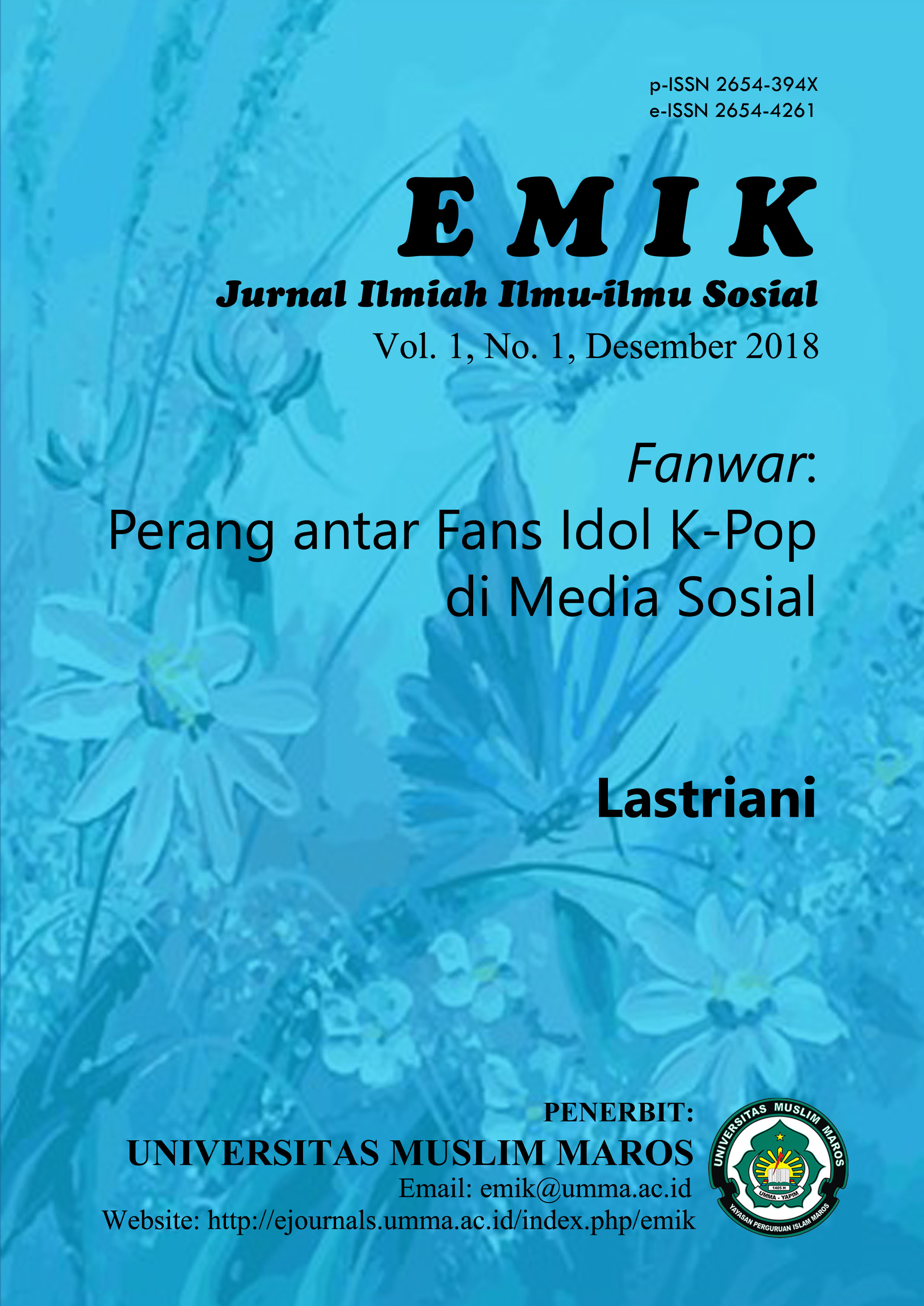Fanwar
Perang antar Fans Idol K-Pop di Media Sosial
Abstract
At present, the use of social media tends to be an inseparable need from humans. In addition to getting daily news, social media also provides information about artists/idols. People who are looking for information about their idols are fans who are generally teenagers, including Indonesian teenagers. There are several idols who are idolized by Indonesian teenagers, including idols from South Korea. This article deals with war between K-Pop idol’s fans in cyber space. The study was conducted through social media, namely Instagram and Twitter that not only fans, but also their idol use Instagram and Twitter as their media of interaction. Therefore, fanwar is also carried out in both social media. Eleven participants get involved in this study. They are Indonesian teenagers who use both social media, consisting of five fans and six who have participated in and/or have carried out fanwar through social media. Data was collected using observation in social media and in-depth interview. The study indicates that fanwar is generally caused by the number of idol voting in the competition, the number of idol’s sold performance tickets, rating of drama, style between idols, and dating style between idols. Fans can be an individual and can also be a group of fans (fandom). But membership can be more than one fandom (multi-fandom). When a fanwar takes place, a person or fandom must choose on which side he/she is taking. However, if someone has more than one fandom (multi-fandom), then usually he/she experiences a dilemma to whom he/she is taking part in fanwar. Therefore, they are usually being passive in fanwar to secure themselves from any of their fandom, Fanwar itself has impacted on the lives of idol fans, both online and in the real world, and both positively and negatively. Positive impact includes relieving stress, getting new friends with fellow fandom (in different cities and/or countries), and feeling satisfaction when defending their idols. Fans who defend their idols are desperately considered by the same fandom members as "true fans". However, fanwar also has negative impacts, namely disrupting the school (due to staying up late to "fight" on social media), wasting their time, having no benefits, and behaving and talking rudely, so they are shunned by friends in the real world. It is argued that the participation of fans in the fanwar reflects their authenticity towards their idols, but fanwar is also a reflection of idol himself/herself. Releasing in the fanwar indicates fans weakness and their idol does not deserve to be idolized.
References
Baym, N. 2012, “Fans or Friends?: Seeing Social Media Audiences As Musicians Do”, Journal of Audience and Reception Studies, 9(2):286-316.
Bungin, B. 2006. Sosiologi Komunikasi: Teori, Paradigma, dan Diskursus Teknologi Komunikasi di Masyarakat. Jakarta: Kencana Prenada Media Group.
Jin, D.Y. dan Yoon, K. 2015. “The Social Mediascape of Transnational Korean Pop Culture: Hallyu 2.0 as Spreadable Media Practice”, New Media and Society, Januari, 18(7).
Jung, S. dan Shim, D. 2014. “Social distribution: K-pop fan practices in Indonesia and the ‘Gangnam Style’ phenomenon”, International Journal of Cultural Studies, 17(5) 485–501.
Kang, J. M. 2017. “Rediscovering the Idols: K-pop Idols Behind the Mask”, Celebrity Studies, 8(1):136-141.
Lastriani. 2018. “EXO-L Makassar: Suatu Studi Komunitas Penggemar Boyband EXO di Kota Makassar”, Etnosia, Juni, 3(1):1-21.
Lie, J. 2013. “Introduction to the Globalization of K-pop: Local and Transnational Articulations of South Korean Popular Music”, Cross-Currents: East Asian History and Culture Review, Desember, 9:40-43, http://cross-currents.berkeley.edu/e-journal/issue-9, diakses tanggal 1 November 2018.
Oh, I. dan Lee, H. 2013. “K-pop in Korea: How the Pop Music Industry is Changing a Post-Developmental Society”, Cross-Currents: East Asian History and Culture Review, Desember, 9:105-125, http://cross-currents.berkeley.edu/e-journal/issue-9, diakses tanggal 5 Oktober 2018.
Pradipta, A. 2016. Fenomena Perilaku Haters Di Media Sosial. Skripsi, Fakultas Ilmu Sosial dan Ilmu Politik, Universitas Diponegoro, Semarang.
Shim, D. 2006. “Hybridity and the Rise of Korean Popular Culture in Asia,” Media, Culture and Society, 28 (1):25–44.
Shim, D. 2013. “An essay on K-pop: Korean Wave, Idols, and Modernity, Social Studies Education, 52(2):13–28.
Sitorus, A. Z. dan Irwansyah. 2017. “Fenomena Haters Sebagai Dampak Negatif Perkembangan Media Sosial di Indonesia”. A Journal of Language, Literature, Culture, and Education Polyglot, July, 13(2):109-121.
Storey, J. 1993. Teori Budaya dan Budaya Pop: Memetakan Lanskap Konseptual Cultural Studies. Yogyakarta: CV. Qalam.
Storey, J. 2006, Cultural Studies dan Kajian Budaya Pop. Yogyakarta: Jalasutra.
Sung, S. 2013. “K-pop Reception and Participatory Fan Culture in Austria,” Cross-Currents: East Asian History and Culture Review, Desember, 9:90-104, http://cross-currents.berkeley.edu/e-journal/issue-9, diakses tanggal 5 Oktober 2018.
Tinaliga, B. 2018. At War for OPPA and Identity: Competitive Performativity among Korean-Pop Fandoms, https://repository.usfca.edu/capstone/768, diakses tanggal 5 Desember 2018.
Yoon, K. 2018. “Transnational Fandom in the Making: K-pop fans in Vancouver”, International Communication Gazette, https://doi.org/10.1177/1748048518802964, diakses tanggal 5 Desember 2018.




